Learning Portuguese is a great adventure, but finding the best books for learning Portuguese is not always the easiest task, especially if you are searching for European Portuguese books, which are the ones I am going to be focusing on in this post.
I could list a variety of books, as there are as many out there as there are students (okay, maybe a bit of an exaggeration, but you get my point!). However, I guess today I will be speaking about those I have been using for my classes and that I turn to when I need some aiding material to make them more valuable and interesting.
Make sure to read until the end, so you can find all about the BONUS.
You can also check out the following video where I am talking about this topic:
# My 5 most used and precious books
When I teach, I generally use the books that I will next present to you.
To make things easier and to cover all topics, I have chosen books that can be divided into sub-categories: grammar; reading, interpretation and writing; vocabulary learning; and exam preparation. They are also more or less divided into different levels.
So, with no further ado, here they come:
1. Grammar book(s) – Levels A1 to C1
When I want to tackle all the little parts of the European Portuguese grammar and I want to give different exercises and explanations to my students, I use “Gramática Aplicada – Níveis A1, A2 e B1” e “Gramática Aplicada – Níveis B2 e C1“.
The first one covers all the grammar that you must understand and know to achieve level B1 of your language process. In this book you can find the explanation for all the verb tenses in the indicative mode, the direct and indirect discourses, the passive voice, determinants and so on. It will basically give you all the knowledge about the grammar considered important to achieve level B1.
The second book – levels B2 to C1 – will continue presenting and explaining the grammar you need for achieving level C1. In it you can find the conjunctive mode of verbs, more on the indirect discourse, the gerund and its use, emphatic expressions and everything on grammar that will make you apt to understand and use the Portuguese grammar at a C1 level.
What I most like about these books
- I really like the way that the topics are introduced –> for the verb tenses, for example, there is always an introduction and an example is given where the verb tense is used. After this, the authors move on to the presentation of the tense, with more examples and brief explanations and/or notes (about exceptions to the rule, for example). In this section the rules for forming the verb tense are typically shown and often tables and schemes are used to improve the learning process. Finally, there is generally an explanation with different examples on the application of the verb tense. I find this to be a really good way of approaching the different grammar topics and it is good that there is a structure, since I believe it makes the studying clearer and easier.
- The presentation of the book is really interesting –> As I previously stated, the book is filled with tables and schemes, which in my opinion makes the learning process easier. The colour scheme is also very clean and I like it that important things are underlined or in bold, to make it more clear what is important and what is less important. The authors also chose to use interesting pictures (cartoon like), which I find quite cool.
- There are a lot of examples and exercises –> For me the most important thing about a grammar book is if it allows the student to exercise what he or she has learnt. These two books do this, since they provide a very wide range of exercises after every topic covered.
Some minor problems about these books
- Only grammar –> It is just only pure grammar. So do buy, borrow, check other books for more in-depth knowledge on the language. You do not want to stick only to grammar.
- Not so natural –> The examples used on the exercises are sometimes a bit weird. They do not sound very natural. What I mean is that an example like ” I do not swallow my pills very well. My grandma also does not swallow her pills very well.” does not sound like a thing someone I know would say. I feel that more “natural” examples would sound better and be more effective for learning.
=> Get the book Gramática Aplicada for beginners HERE!
=> Get the book Gramática Aplicada for advanced students HERE!
2. Reading, Interpretation and Writing book – Levels B1/ B2 and up
For helping my students going further with their Portuguese, I show them the book entitled “Falar pelos cotovelos“, which literally means “talking through the elbows” (a saying used when someone can’t seem to stop talking). In this book you can explore the language beyond the thick walls of grammar. There are texts, questions about the texts, songs to listen, images to describe, etc. Basically anything that can help you explore European Portuguese as a whole and that will allow you to further improve your knowledge and capabilities on reading and interpreting text, as well as writing.
What I most like about this book
- Very natural resources –>My favourite thing about “Falar pelos cotovelos” is that it allows you to explore the language in a very smooth way, making everything feel natural. This happens because the authors use very different resources. They use texts taken from wikipedia Portugal, the newspaper, Portuguese TV and radio, recipes, sketches from Portuguese television, audios from different sources. They really use anything that is natural and generated by natural everyday Portuguese.
- DVD included –>The book also contains a dvd, which allows you to hear the audio exercises and to watch the videos belonging to the exercises with video. This can be really helpful when learning a language and for me it is a big plus!
- Nice use of visuals –> “Falar pelos cotovelos” contains many pictures related to the topics being covered, which in my opinion makes it easier to study;
- Communicative and intercultural –> It is a great tool to develop the student´s intercultural and communicative capacities, since it includes many cultural themes and it promotes the communication through different exercises.
Some minor problems about this book
- Only for students at intermediate and up levels –> The only thing I can point out about this book is that it does not explain anything about grammar. Thus, you have to already have some knowledge of the language to be able to use it. In fact, this is a book only suitable for students already in the levels B1 and up, so make sure to go through other books first if you are still at the beginning of your learning process.
=> Get your book “Falar Pelos Cotovelos” HERE!
(don´t worry, the book is not for Brazilian Portuguese as written in the description, but for European Portuguese)
3. Vocabulary Book – Levels C1 and C2
One of the books I use for my most advanced students is called “Português Outra Vez” (meaning “Portuguese Again”). This book covers one of the most difficult part of the language – sayings and proverbs. In fact, in any language this is the hardest part to learn and you can tell if a student is really advanced by the way he uses and understands the sayings and proverbs of the language. In “Português Outra Vez” you can find many exercises where you are asked to fill in the blanks or complete a sentence with a saying or a proverb.
What I most like about this book
- Nice topic –> I really enjoy the theme of proverbs and sayings, and I really appreciate it that there is a whole book covering it for the students;
- Enhancement of vocabulary –> It allows you to expand your vocabulary because it covers a wide range of themes;
- Good division of topics –> The book is divided into themes. So in the first part, for example, you have many exercises about sayings that use the weather and environment theme (i.e. that talk about rain or sun or the moon…). From my experience, this makes it easier for the students to memorise everything.
Some minor problems about this book
- Lack of visuals –> It does not contain any images;
- Specific topic –> It covers only a very specific theme, so you definitely do have to have other books if you are aiming for more subjects;
- Only for advanced students –> It is only suitable for students with a C1 and C2 level, so only very advanced students can use it.
=> Get your book “Português outra vez” HERE!
(Again: don´t worry if it says in the description the book is in Spanish… it is not! Apparently some people do not know that Portugal has its own language 😉 )
4. Exam preparation book – CAPLE, DIPLE, DEPLE
Many of my students are taking classes with me because they want to take exams in a certain level of Portuguese. There are different exams – CAPLE (level A2), DEPLE (B1) and DIPLE (B2) – for different levels of Portuguese. To prepare my students to these exams, I give them varied exercises and when I feel that they are ready I give them some of the mock exams from the book “Exames de Português – CAPLE-UL“. In this book, students can find an overview of all the subjects, type of questions and variations of exercises they can expect in an exam. There are reading and comprehension, production of texts, speaking and listening exercises. For each type of exam there are at least two versions for the students to train their skills.
What I most like about this book
- Good overview –> “Exames de Português – CAPLE-UL” contains tables explaining in detail which parts students can count on in the exam and how much time in average each part of the exam takes; It also gives an excellent overview on what kind of exercises students can expect in an official exam;
- Good exercise for preparation –>This book allows the students to practice their skills and check which ones they need to develop and exercise more;
Some minor problems about this book
- Only some levels are covered –> It would be good if this same book would contain exams for all the levels, instead of only for these three levels.
=> Get your exam preparation book “Exames de Português CAPLE-UL” HERE!
5. My favourite Workbook – Passaporte para Português
This workbook is so great! It divides each chapter into easy-to-follow lessons. It also contains lots of audio exercises and it brings a CD so you can easily listen to the audios that help you completing the tasks.
What I most like about this book
- Diversity –> The topics are very diverse, with a lot of different texts and covering many different topics. It also allow students to exercise all aspects of the language – listening, writing, comprehension and speaking. It explores grammar, vocabulary and it also gives some insights into the culture of Portugal.
- Exercise book –> It brings an exercise book which allows students to consolidate all the knowledge acquired.
Some minor problems about this book
- I still did not find any problems about this book, but let me know if you do =)
=> Get your class workbook “Passaporte para Português” HERE!
BONUS:
So, books are good and the books I just recommended are some of the best to learn European Portuguese.
However, if you are searching for something that will guide you all the way through and help you become a fluent speaker of the language, you should check out my 100% online European Portuguese course.
Alright, I hope you will find value in the descriptions above and that you will be using one, some or all of these books. For me they are some of the best books for learning Portuguese and I am sure they can help you a lot in your learning process.
What about you? Do you think they are good books? Have you used any of them? Do you have a different opinion? Would you like to contribute and give brief reviews about other books you use?
Please leave your comment below and let us know what your ideas are!
If you have any question, do not hesitate to ask!
See you soon!
Beijinhos,
Mia

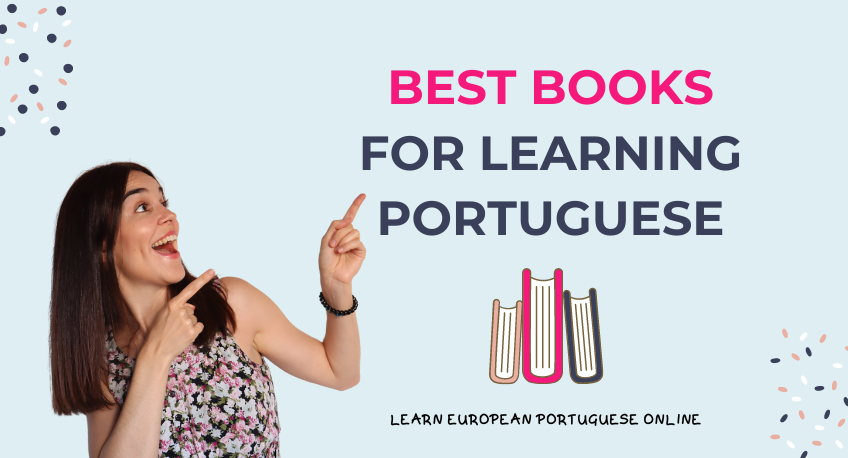
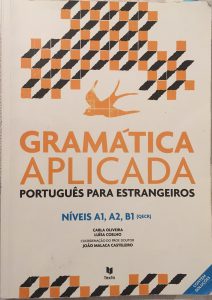
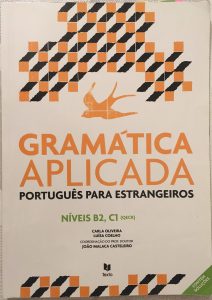
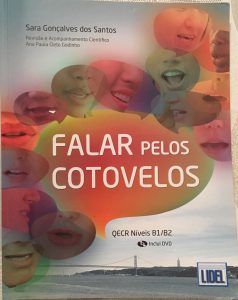
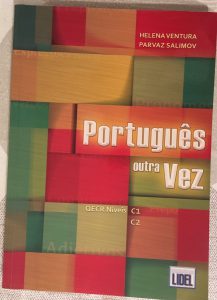
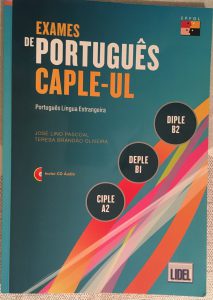
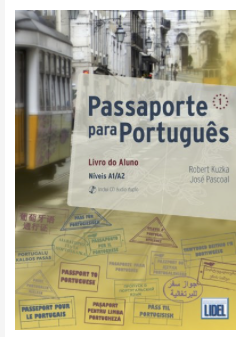
Hi Mia! Does the passeport workbook have answers included? I’m in the bookstore and I can’t see any! Is this just a student book so no answers? 🙁 Obrigada!
Olá, Sky.
There’s a book of Passaporte para Português dedicated to exercises. It’s called “Caderno de Exercícios”, but it is an independent one.
In the “livro do aluno” I believe you have some exercises, but the one dedicated exclusively to exercises is the one I mentioned before.
Hope this helps!
Beijinhos,
Mia
Hi , I am pardeep and I live in beja. I was looking for European Portuguese language grammar books A1 and A2 ( English to Portuguese ), but I couldn’t get any book yet . Can you please help me . Thank you in advance
Hi Pardeep,
thank you for your comment.
In the article I mentioned some books and there are also links where you could buy them online. Did you see them?
Please let me know in case you have any questions.
Beijinhos,
Mia
Hello,
Can you please tell me is the book “Gramática Aplicada – Níveis A1, A2 e B1” all in Portuguese or it is designed for English speaking people to learn Portuguese grammar and therefore the explanations are in English?
Thanks
Ernest
Olá 🙂
Thank you for your question.
Actually these books are in Portuguese but they have a lot of visual aids so I don’t think they’re THAT hard.
If you want explanations in English you could maybe be interested in joining my course online. I do explain the basics all in English and the price is almost the price of two of these books together. It’s 59$ for the first A1 level. Just putting it out there in case you are interested 🙂
Hi, Ms Mia. May I ask if you have launched any exam preparation course?
Olá 🙂 Thank you for your comment. I don’t have a specific course that targets the exam preparation, but I have a course that targets the A1 and A2 levels, which you can check here:
https://school.learn-portuguese.org/p/learn-european-portuguese-online-a1-a2-course-bundle-for-beginners
This course follows the European Framework of Reference for Languages, which tells us teachers what students need to know at a certain level to pass on the level exams.
I did have students which took this course and did the A2 level exam successfully. They joined my course and had some extra conversation classes to enhance their speech performance and they had good results.
If you have any questions, please let me know.
Hi Mia!
Thank you for the recommendations!
I have been studying the grammar books and they are more complete than the ones I already had.
If somehow I manage to master the grammar, I will check the rest of the books 😀
Parabéns pelo blog!
Obrigada CJ!
I am glad that you are enjoying the books and that they are helping you!
I am sure that with hard work and perseverance you will get the grammar eventually!
But most of all, just do not forget to have fun while learning..that is the most important thing =)
Beijinhos,
Mia.
Portuguese is such an exciting language… Always dreamed of learning it since one of my biggest idols Christiano entered my life 😀
Your book suggestions are very helpful, I will defiantly look into them!
Do you have any favorite Portuguese learning book you would recommend to a complete newbie?
obrigado 🙂
Hi! Thank you for your comment. In fact, some of the books I recommend are for total beginners so any of those should be fine 🙂
Hope that helps!
Mia
Hi Mia,
You mention that these are the books you yourself use for teaching and you have pointed out what you like about them and what you don’t like. But am I right in thinking that none of these books would be suitable for beginners wanting to teach themselves? I have started teaching myself Portuguese on duolingo.com, but it would be really useful to have a good textbook to learn from. Are there any you could recommend?
I notice you explain several points about topics that people find difficult in Portuguese and I will bookmark your site and come back.
Hi Isabella!
Thank you for your interest and your comment.
Well, in fact, all these books can be used for self-study as well. However, you might want to try the easier ones I mention – the ones from level A1 to B1. If you are learning European Portuguese be also aware that Duolingo only offers Brazilian Portuguese so the pronunciation of words and some vocabulary, as well as some grammar aspects are different. I will be very glad if you come back to my page. I am constantly updating it with materials and I will soon have some videos and audios too 🙂
See you soon!
Mia
Thank you so much for your reply, Mia. (I told you I’d come back… :-))
I really appreciate you taking the time to answer my question.
I am tutoring a few adults and children from Brazil, so Brazilian Portuguese is fine for me. And one girl has a mother from Bolivia and a father from Portugal. She speaks Spanish, Portuguese and English, but neither the father nor the mother can help her at school, neither parent can read her stories in English etc., some parents are now applying for a British passport and need to pass an English test. So for me it’s really helpful to know a bit of Spanish and Portuguese, but I myself don’t need to pass any exams.
I look forward to reading more of the material here. Thanks again.
Isabella
Thanks for coming back, Isabella!
That must be a great experience! Do you enjoy teaching in Brazil?
I understand that you find it helpful to learn a bit of Portuguese and I am glad if my website can help you with it 😀
As I mentioned before, I am always trying to improve it and I am always updating it with new content. So please do continue to come back =) I will be glad!
If you need anything or have any specific questions about the language, do not hesitate to contact me!
I wish you lots of success with your teaching!
Kind Regards,
Mia
This is going to come in handy for me, Portuguese is one of the languages that I have wanted to learn for some time and haven’t had the time or money plus it will allow me to teach my daughter a second language. I think you did a great job on giving the pros and cons of each set of books. It looks like pairing them up is the best learning tool. Thanks so much.
Hi Candice,
Thank you for your comment =)
Yes, no doubt that pairing them up would be the best solution! You are right. Just take a look at the different levels and have fun learning and teaching your daughter!
Please do come back and let me know how your evolution is going. I will be posting some videos and audios later on, so maybe that will be handy too, but I do recommend getting some of these books to get started.
Thank you again and have a nice day,
Mia
Mia, what a wonderful walk-through highlighting great literature for learning European Portuguese. I had a friend who spoke Brazilian Portuguese when I used to live in Florida. I always envied her ability to speak both Portuguese and English. Thanks for all the time you put into providing thorough information!
Hi Clint!
Thank you for taking the time to commenting on my blog post. I am glad that you found it useful =) My goal is always to write posts that will teach something in a fun way. I hope this was the impression you got from what I wrote.
Please do come back, as I will always be adding more materials and posts about my beautiful language and country. Who knows? Maybe you can learn the language and have conversations both in English and Portuguese with your friend and not feel jealous about it anymore 😉
Have a really nice day,
Mia
Very helpful page with plenty of suggestions and recommendation! I’ve been curious to learn a new language as you never know when that skill will come in handy and this page has convinced me of where to start with plenty of information and choices of various books on the subject!
Hi kenuetrecht.
Thanks for your comment and your positive words.
If you want to get some first insights in European Portuguese you can check out my Material page, in which I am offering free material for beginners. In my blog posts you will also find pronunciation samples and many other interesting stuff about the Portuguese language and culture 🙂
Feel free to try it out!
Have a great day.
Mia.
Bon Dia Mia,
Your site is fabulous! And your approach very original and unique.
I loved the library, with the 5 must have books
Your menu with quick links is a real teaser. And your menu a master guide!
Awesome you! Well done.
I always looked for a site like yours to learn a language and really, yours is co’plete.
Thank you
Hi Fleeky, thank you so much for your comment and your positive feedback!
I am happy that you like my page, if you want to listen to some Portuguese words you can check out my pronunciation section in “Material” ?
I would appreciate if you come back more often as I will update the material section more frequently now.
Have a great day!
Mia.